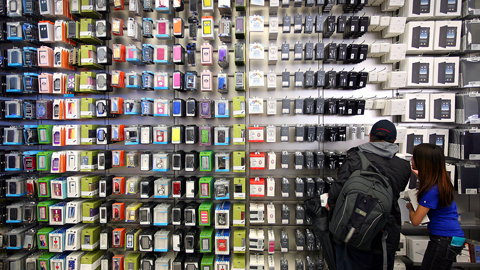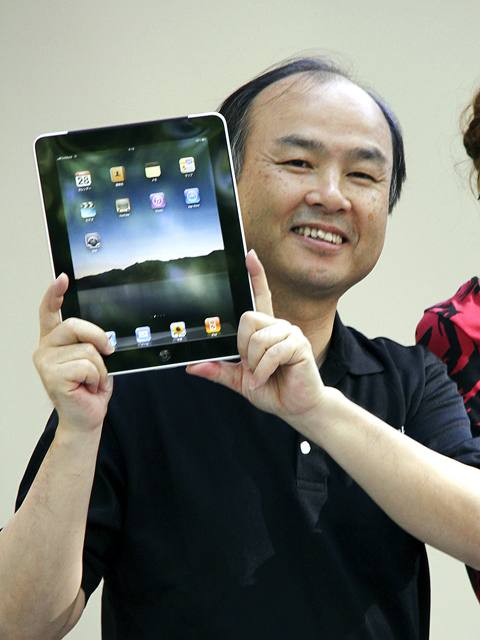Thousands of fired up and sleep-deprived gadget fans mobbed shops in Australia and Japan yesterday as Apple’s iPad, touted as a revolution in computer use and publishing, began its international launch.
A line some 200m long stretched round the block at Apple’s flagship central Sydney store, flummoxing commuters bemused by the hype, while similar scenes played out in downtown Tokyo.
The iPad — a flat, 25cm black tablet targeted at the leisure market — was also going on sale in Britain, Canada, France, Germany, Italy, Spain and Switzerland yesterday as part of a staggered global roll-out.

PHOTO: BLOOMBERG
In central London about 40 enthusiasts clad in sleeping bags and blankets were lining up in the middle of the night outside the city’s cavernous Apple store.
In Sydney, security guards had to quell pushing and shoving amongst the media as Rahul Koduri, who lined up for 30 hours from 2am on Thursday, became the first to buy the touch-screen computer.
“It’s fantastic, it was so worth the wait,” said the 22-year-old, brandishing two iPad boxes after his long wait in the chill of the late Australian autumn.

PHOTO: BLOOMBERG
The international launch date was pushed back by a month after huge demand in the US, where 1 million iPads were sold in the first 28 days after the product’s debut early last month.
Prices in Japan and Australia for the basic 16GB iPad are comparable to US prices, once sales tax is included, although a significant markup by Apple in Britain and continental Europe has triggered some grumbling.
In Australia a 64GB version that runs on advanced 3G phone networks is priced at A$1,049 (US$889), which in sterling terms is around 13 percent cheaper than in Britain. In Japan, whose corporate giants once ruled the technology roost, more than 1,000 buyers lined up in front of Apple stores and outlets of its exclusive local partner, mobile phone carrier Softbank, along with big electrical shops.
Media crews flocked to the stores as broadcasters flew helicopters to gain aerial views of a 1,200-strong line at the Apple store in Tokyo’s Ginza shopping district.
Kazuki Miura, a 38-year-old freelance technology writer wearing a home-made iPad headpiece, was the first to get his hands on the gadget at Softbank’s main Tokyo store.
“Now the time has come for us to hold an iPhone in the right [hand] and iPad in the left — just like the samurai with two swords,” Softbank president Masayoshi Son said at an in-store presentation.
The multi-functional device is tipped by some pundits to revitalize media and publishing, with many major newspapers and broadcasters launching applications.
However, in Japan, content providers including powerful newspaper groups — less affected by the market downturn that is roiling media groups in the West — are taking a wait-and-see approach about rolling out iPad “apps.”
On London’s upmarket Regent Street, Jake Lee, a 17-year-old student from Essex, was at the front of the line with two friends after a 15-hour wait that had stretched since midday on Thursday.
The group had received “a few weird looks” and an offer of £200 (US$290) to give up their places at the front of the line, but they refused.
“It’s for us, we don’t want to give it to anyone else,” Lee said.
California-based Apple plans to bring the iPad to Austria, Belgium, Hong Kong, Ireland, Luxembourg, Mexico, the Netherlands, New Zealand and Singapore in July.
More than 5,000 apps have been developed for the device, according to an Apple spokesman, in addition to the 200,000 programs already available for the iPhone and iPod Touch, most of which run on the iPad.
Capital Markets analyst Mike Abramsky estimated that Apple is selling more than 200,000 iPads a week — more than estimated Mac computer sales of 110,000 a week, and vying with iPhone 3GS sales of 246,000 a week.
Apple has declined to reveal the number of pre-orders received for the iPad internationally, but Abramsky put it at around 600,000.

STILL COMMITTED: The US opposes any forced change to the ‘status quo’ in the Strait, but also does not seek conflict, US Secretary of State Marco Rubio said US President Donald Trump’s administration released US$5.3 billion in previously frozen foreign aid, including US$870 million in security exemptions for programs in Taiwan, a list of exemptions reviewed by Reuters showed. Trump ordered a 90-day pause on foreign aid shortly after taking office on Jan. 20, halting funding for everything from programs that fight starvation and deadly diseases to providing shelters for millions of displaced people across the globe. US Secretary of State Marco Rubio, who has said that all foreign assistance must align with Trump’s “America First” priorities, issued waivers late last month on military aid to Israel and Egypt, the

‘UNITED FRONT’ FRONTS: Barring contact with Huaqiao and Jinan universities is needed to stop China targeting Taiwanese students, the education minister said Taiwan has blacklisted two Chinese universities from conducting academic exchange programs in the nation after reports that the institutes are arms of Beijing’s United Front Work Department, Minister of Education Cheng Ying-yao (鄭英耀) said in an exclusive interview with the Chinese-language Liberty Times (the Taipei Times’ sister paper) published yesterday. China’s Huaqiao University in Xiamen and Quanzhou, as well as Jinan University in Guangzhou, which have 600 and 1,500 Taiwanese on their rolls respectively, are under direct control of the Chinese government’s political warfare branch, Cheng said, citing reports by national security officials. A comprehensive ban on Taiwanese institutions collaborating or

France’s nuclear-powered aircraft carrier and accompanying warships were in the Philippines yesterday after holding combat drills with Philippine forces in the disputed South China Sea in a show of firepower that would likely antagonize China. The Charles de Gaulle on Friday docked at Subic Bay, a former US naval base northwest of Manila, for a break after more than two months of deployment in the Indo-Pacific region. The French carrier engaged with security allies for contingency readiness and to promote regional security, including with Philippine forces, navy ships and fighter jets. They held anti-submarine warfare drills and aerial combat training on Friday in

COMBAT READINESS: The military is reviewing weaponry, personnel resources, and mobilization and recovery forces to adjust defense strategies, the defense minister said The military has released a photograph of Minister of National Defense Wellington Koo (顧立雄) appearing to sit beside a US general during the annual Han Kuang military exercises on Friday last week in a historic first. In the photo, Koo, who was presiding over the drills with high-level officers, appears to be sitting next to US Marine Corps Major General Jay Bargeron, the director of strategic planning and policy of the US Indo-Pacific Command, although only Bargeron’s name tag is visible in the seat as “J5 Maj General.” It is the first time the military has released a photo of an active